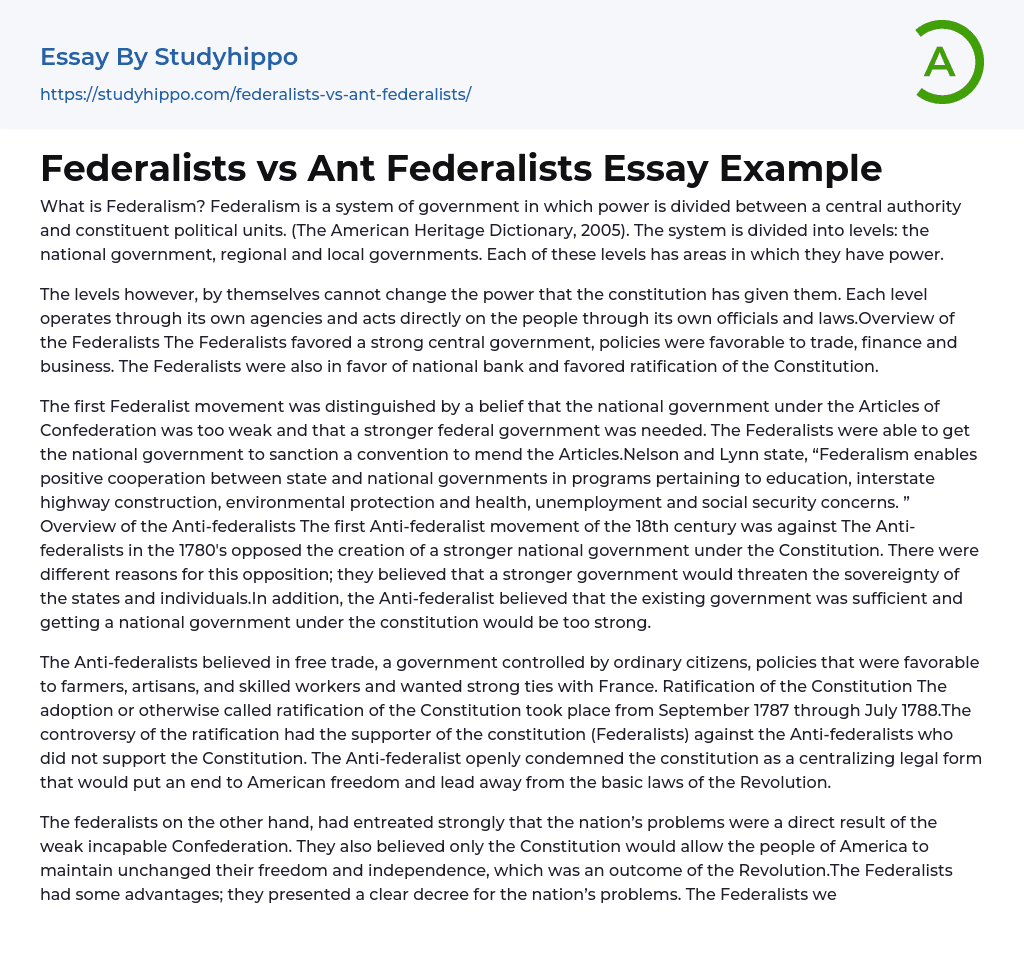Federalism refers to a governmental system whereby power is distributed between constituent political units and a central authority (The American Heritage Dictionary, 2005). The system comprises of multiple levels, including national government, regional and local governments. Each of these tiers has its own areas of jurisdiction.
While government levels cannot change their constitutional authority, they can still have a direct impact on citizens through legislation and officials. The Federalists believed in a powerful federal government that promoted trade, finance, and commerce. Additionally, they endorsed the establishment of a national bank and the adoption of the Constitution.
The Federalist movement emerged with the belief that the central government established by the Articles of Confederation was insufficient and advocated for a stronger federal system. They succeeded in securing approval for a convention to amend the Articles. According to Nelson and Lynn, federalism fosters positive coo
...peration between state and federal governments on issues such as education, interstate infrastructure, environmental conservation, healthcare, unemployment, and social welfare.
In contrast, the Anti-federalist movement during the 18th century opposed creating a more powerful national government under the Constitution. Their primary concern stemmed from fear that such a government would infringe upon state and personal sovereignty. Additionally, they believed that the current government was adequate while one formed under the Constitution would be too potent.
The Anti-federalists held beliefs in free trade, government control by regular citizens, policies beneficial to farmers, skilled workers, and artisans, as well as close relations with France. From September 1787 through July 1788, the ratification of the Constitution (also known as adoption) generated controversy between the Constitution's supporters (Federalists) and Anti-federalists who opposed it. The Anti-federalists openly disapproved of th
Constitution as a centralizing form of law that would limit American freedom and deviate from the Revolution's fundamental laws.
Although the Anti-federalists had backing from state politicians and a doubtful population, the Federalists firmly believed that America's hard-won freedom and independence could only be maintained by the Constitution as they perceived the weak Confederation to be responsible for the nation's problems. The Federalists enjoyed several advantages such as their ability to collaborate with politicians from different states, their financial resources, and organizational skills. Moreover, Benjamin Franklin and George Washington provided their support to this renowned political faction.
The Anti-federalists emphasized the need for a Bill of Rights in the Constitution during the ratification process. This process involved a heated debate on constitutional theory and politics, as it was the first time a nation's population had a say in their desired government. According to Bernstein (2007), this ratification played a crucial role in establishing a unified political community that has shaped modern society.
(2008). Frederick D. Drake's article on the Ratification of the Constitution retrieved on March 13, 2008 from http://www.answers.com/topic/ratification-of-the-constitution.
- The website http://www. provides information on teaching about federalism in the United States, according to Nelson, Lynn R. (2002). The source was retrieved on March 14, 2008.
The American Heritage® Dictionary of the English Language, Fourth Edition (2005) can be found on the website ericdigests.org/2003-1/usa.htm and was retrieved on 13, 2008 from http://www.ask.The HTML-tagged content below pertains to the topic of federalism, and can be found at this specific URL: com/reference/dictionary/ahdict/38776/federalism.
- First Amendment essays
- Federal government essays
- Armed Forces essays
- Confederate States Of America essays
- Federal Government Of The United States essays
- Fourteenth Amendment To The United States Constitution essays
- Governance essays
- Parliament essays
- Politics essays
- Jurisdiction essays
- Bureaucracy essays
- Separation Of Powers essays
- Congress essays
- President essays
- United States Congress essays
- Non-Commissioned Officer essays
- Appeal essays
- Revenge essays
- Corporate Governance essays
- Public Service essays
- Income Tax essays
- Supply essays
- Red Cross essays
- Democracy essays
- State essays
- Liberty essays
- Absolutism essays
- Reform essays
- Republic essays
- John Marshall essays
- Bourgeoisie essays
- Developed Country essays
- Elections essays
- International Relations essays
- Left-Wing Politics essays
- Monarchy essays
- Political Corruption essays
- Political Party essays
- Political Science essays
- Sovereign State essays
- United Nations essays
- World Trade Organization essays
- Contras essays
- Dictatorship essays
- Foreign policy essays
- Monarch essays
- Corruption essays
- Foreign essays
- Democratic Party essays
- European Union essays




